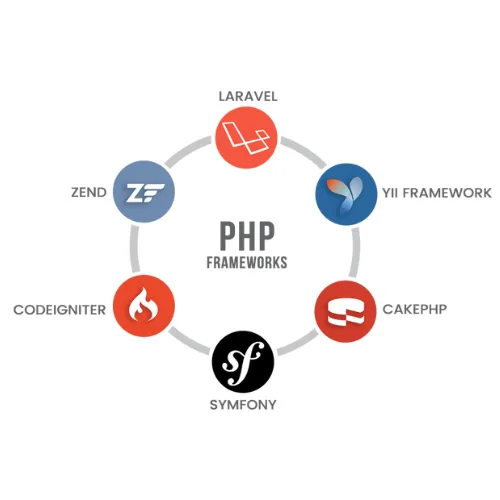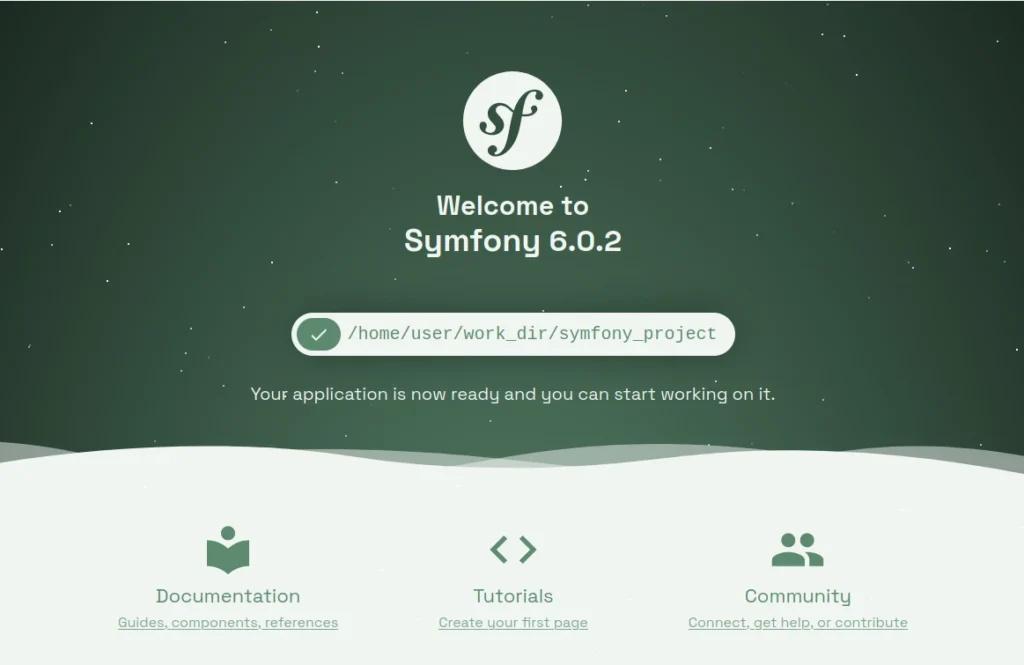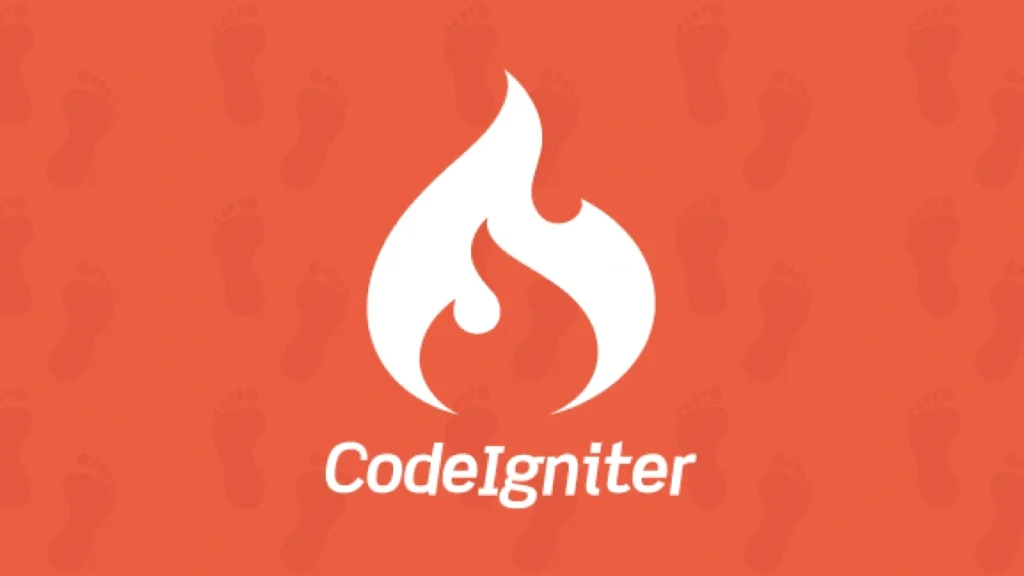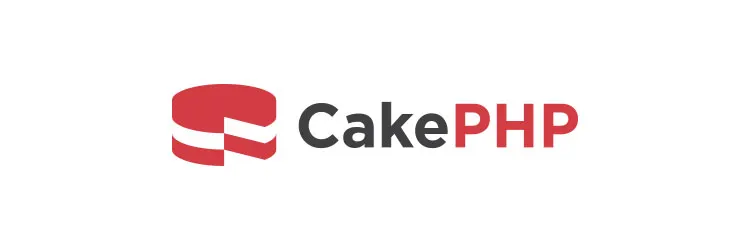What is a PHP Framework?
A PHP framework provides a structured way of building web applications. It offers pre-built modules, libraries, and tools that speed up development and reduce repetitive tasks. Popular PHP frameworks like Laravel, Symfony, CodeIgniter, and Yii provide developers with a solid foundation for building robust applications.
And This built on the open-source language PHP and offers built-in features to improve your software development lifecycle. These features increase development speed and improve performance within your team by lowering the workload of your developers.
Why Choose Laravel?
Laravel has become a preferred choice for developers due to its elegant syntax, extensive documentation, and robust ecosystem. Some of its key features include:
- Elegant Syntax: Laravel offers clean, readable, and expressive syntax, making development enjoyable and efficient.
- Built-in Features: It provides powerful built-in tools like authentication, routing, and caching.
- MVC Architecture: Laravel follows the Model-View-Controller (MVC) pattern, ensuring code organization and maintainability.
- Eloquent ORM: The Eloquent ORM simplifies database management with an intuitive and efficient query-building process.
- Security: Laravel includes robust security features like hashed passwords, CSRF protection, and SQL injection prevention.
- Blade Templating Engine: The Blade engine allows easy and dynamic UI creation with reusable components.
- Artisan CLI: Laravel’s Artisan command-line interface streamlines common development tasks.
- Community Support: With a large and active community, developers can easily find resources, tutorials, and packages.
- Scalability: Laravel supports large-scale applications with features like caching, queues, and job scheduling.
- API Support: Built-in support for API development with resources like Laravel Passport and Sanctum.
Features:
- Scalable and secure.
- Functionality packages and email integration.
- Highly active community support.
- Supports MVC architecture.
Drawbacks:
- Steeper learning curve for beginners.
- Heavy reliance on third-party tools for advanced features.
Companies Using Laravel:
- Pfizer, Tour Radar, BBC
Other Popular PHP Frameworks
Symfony
Symfony is a flexible and scalable framework known for its reusable components. It’s a great choice for complex enterprise applications.
Pros:
Modular components
Strong community support
Suitable for large-scale applications
Cons:
Steeper learning curve
Requires additional configuration
Symfony, which was released in 2005, is a modular-based PHP frameworks that is an ideal framework for large-scale corporate applications. Also, the best thing about Symfony is within a click, deployment is done. Moreover, setup and configuration are also easy. Popular projects that use Symfony are Drupal8, publish, eZ, and Open Sky. Being an extensive frameworks, it also has high community support. Due to the extensive availability of libraries and components, it is generally the first choice of developers. It allows integration with other vendor libraries and this is why Symfony should be the preferred choice if you want to create flexible and feature-rich applications.
CodeIgniter
CodeIgniter is a lightweight PHP framework ideal for beginners and small projects. It provides a simple yet powerful toolkit for building dynamic web applications.
Pros:
Minimal configuration
Easy to learn
Fast performance
Cons:
Limited built-in libraries
Fewer third-party integrations
Yii
Yii stands for “Yes, It Is!” and is a high-performance PHP framework. It’s suitable for developing large-scale web applications.
Pros:
Excellent security features
Fast development with code generation tools
Supports RESTful API development
Cons:
Requires advanced PHP knowledge
Smaller community compared to Laravel
Zend Framework
The Zend framework is now known as Laminas. It is an object-oriented PHP framework designed for enterprise-level applications.
Pros:
Highly customizable
Enterprise-level security
Supports modern PHP features
Cons:
Complex for beginners
Slower development compared to Laravel
Cakephp
CakePHP is an open-source PHP framework that follows the Model-View-Controller (MVC) architecture. It is designed for building web applications quickly and efficiently by providing a structured and organized way of coding. Known for its simplicity and convention-over-configuration approach, CakePHP offers developers a range of built-in tools for database management, form handling, security, and authentication.
Key Features of CakePHP
ORM (Object-Relational Mapping): Simplifies database interactions.
MVC Architecture: Separates logic, data, and presentation for cleaner code.
Built-in Security: Provides CSRF, XSS protection, and input validation.
CRUD Scaffolding: Quickly generate code for basic operations (Create, Read, Update, Delete).
Flexible Templating: Offers a straightforward templating engine.
Community Support: Active community with detailed documentation.
Examples of Laravel Applications
eCommerce Platforms: Build scalable online stores.
Content Management Systems (CMS): Manage website content efficiently.
Customer Relationship Management (CRM) Systems: Handle customer data and interactions.
API Development: Create secure and reliable APIs.
Enterprise Resource Planning (ERP) Systems: Manage business processes.
Examples of Other PHP Framework Applications
Symfony: Large-scale enterprise applications and complex APIs.
CodeIgniter: Small to medium-sized websites and apps.
Yii: Portals, forums, and eCommerce sites.
Zend Framework: Enterprise-grade applications and financial systems.
FAQs
1. Which PHP framework is best for beginners?
- CodeIgniter is generally recommended for beginners due to its simplicity and user-friendly documentation.
2. Is Laravel better than Symfony?
- It depends on your project. Laravel is ideal for quick development and small to medium applications, while Symfony is suitable for large-scale, enterprise applications.
3. Why is Laravel so popular?
- Laravel offers extensive features, easy syntax, and an active community, making it one of the most preferred PHP frameworks.
4. Can I build APIs using PHP frameworks?
- Yes, frameworks like Laravel and Symfony are excellent choices for building RESTful APIs.
5. How do I choose the right PHP framework for my project?
- Consider factors such as project size, development time, scalability, and your expertise level. Laravel is often a balanced choice for most web applications.
Conclusion
Choosing between Laravel and other PHP frameworks depends on your project requirements and development preferences. Laravel is an excellent choice for rapid application development with a clean and elegant syntax. However, if you’re working on a large-scale, complex application, Symfony or Zend Framework may be more suitable.
Evaluate your needs, test out different frameworks, and select the one that aligns best with your goals. Happy coding!









